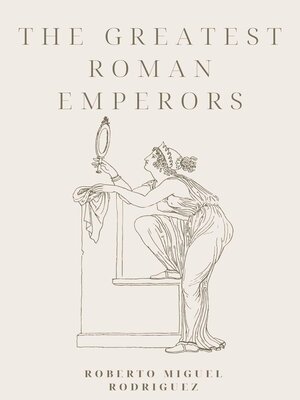
Sign up to save your library
With an OverDrive account, you can save your favorite libraries for at-a-glance information about availability. Find out more about OverDrive accounts.
Find this title in Libby, the library reading app by OverDrive.



Search for a digital library with this title
Title found at these libraries:
| Library Name | Distance |
|---|---|
| Loading... |
The Greatest Roman Emperors
The Greatest Roman Emperors explores the reigns of ten pivotal leaders who shaped the Roman Empire, each contributing to its rise, expansion, and transformation in distinct ways. From Augustus, who laid the foundations of imperial Rome, to Theodosius I, who solidified Christianity as the empire's official religion, this book delves into the legacies of rulers who defined an era.
Augustus (27 BCE – 14 CE): As the first emperor, Augustus, born Gaius Octavius, engineered the transition from republic to empire, ushering in the Pax Romana and stabilizing Rome after years of civil war. His reforms in government, military, and culture set the framework for Roman imperial rule.
Tiberius (14 – 37 CE): Augustus' stepson, Tiberius expanded Roman territories but struggled with increasing paranoia and authoritarianism. His reign's repressive atmosphere and reliance on informers set a dark precedent for future emperors.
Trajan (98 – 117 CE): Trajan's reign marked the empire's greatest territorial expansion, with victorious campaigns in Dacia. Known for his public works and social programs, including the iconic Trajan's Column, Trajan's rule symbolized military prowess and civic development.
Hadrian (117 – 138 CE): Focusing on consolidation rather than expansion, Hadrian strengthened the empire's borders, most famously with Hadrian's Wall in Britain. His reign was also a cultural renaissance, promoting the arts and reforming Roman law.
Constantine the Great (306 – 337 CE): Constantine's conversion to Christianity transformed the Roman Empire. His Edict of Milan granted religious tolerance, and his founding of Constantinople marked the beginning of the Byzantine Empire. His reign reshaped the empire's religious and political landscape.
Julius Caesar (49 BCE – 44 BCE): Though not officially an emperor, Julius Caesar's actions directly led to the fall of the Roman Republic. His military conquests and the crossing of the Rubicon set the stage for Augustus's rise and the beginning of imperial rule.
Nerva (96 – 98 CE): As the first of the "Five Good Emperors," Nerva's short reign set the precedent for adopting capable successors, ensuring stability and good governance within the empire.
Marcus Aurelius (161 – 180 CE): Known as the "Philosopher King," Marcus Aurelius combined military leadership with Stoic wisdom, offering insight into personal virtue and leadership. His reign, marked by constant warfare, brought stability, but also signaled the decline of the Pax Romana.
Diocletian (284 – 305 CE): Diocletian's reign was a time of dramatic change, introducing the Tetrarchy to divide and manage the empire more effectively. His economic reforms were counterbalanced by his harsh persecution of Christians.
Theodosius I (379 – 395 CE): Theodosius solidified Christianity's position as the state religion and oversaw the empire's division into Eastern and Western Roman Empires. His reign marked the end of pagan dominance and the rise of Christian Rome.
This book offers a comprehensive look at the individuals who not only expanded the empire's borders but also transformed its culture, economy, and religion, leaving legacies that resonate through history.







